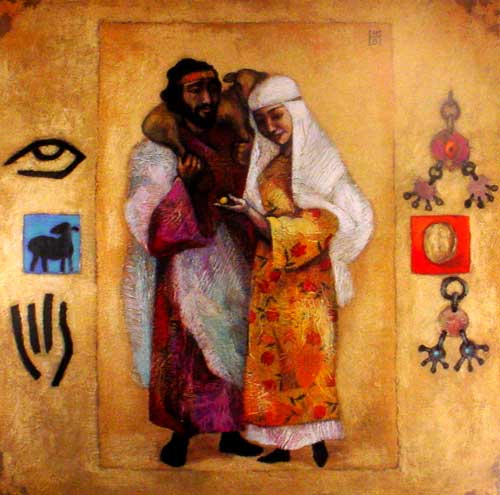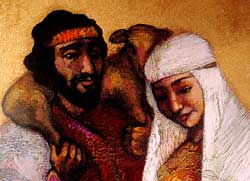


"The Net, The Lost Coin, The Lost Sheep" by Kazakhstan Artist Nelly Bube.



There are seven parables in Matthew 13. After Jesus spoke the first, The Sower, the disciples asked: "Why do you speak to them in parables?" He explained in detail (verses 11-17) and then explained this first parable. Then He spoke three more parables. After dismissing the crowds, in the house the disciples asked for an explanation of the Parable of the Tares. Then He spoke the three parables in today's pericope. From verses 51-52 we see that, under the tutelage of Jesus, the disciples had made progress in understanding. Jesus adds a word concerning the substance of the teaching of a true teacher of the Kingdom. Verse 52 contains a little parable, a simile.
In this parable the Kingdom of Heaven is compared to a thing, a treasure. This is the Gospel. A treasure is something which is prized highly. It was "hidden", utterly concealed. Yet close at hand. Compare Romans 10:8 and Deuteronomy 30:11-14. The Word of God and its precious Gospel are very available to mankind but is completely hidden and meaningless until God Himself reveals the meaning.
He found it quite accidentally. An example would be the woman at the well at Sychar, John 4. She came seeking earthly water but, in the providence of God, found the water of life. Another example would be St. Paul in Acts 9. In God's providence He found the Lord while he was intent on persecuting Him.
"He buried it again." This does not mean that it was meaningless to him but that he prized it very highly. He himself is very happy. The word "joy" is used at least fifty-nine times in the New Testament. Except for its use in an axiom (John 16:21) it is never used of unregenerate man. It is used often of the joy of faith, especially in trying circumstances and deep sorrow. It is used of the angels (Luke 15:7.10). It is used of heaven itself (Matthew 25:21.23). It is the fruit of the Holy Spirit (Galatians 5:22).
The last part of this verse (44) means that the treasure of the Gospel (the Kingdom of Heaven) means much more to him than all else. Read Philippians 3:2-11. Of all Jews Paul could have based his relationship to God on earthly prerogatives and works more than any other Jew. But when God revealed the Gospel to him, Paul considered all previous gain loss, dung, manure. He had found the righteousness of God which came to him by faith, quite apart from works and human worthiness. Read the account of Zacchaeus in Luke 19:1-10. In his curiosity merely to see Jesus, Jesus found him. Christian pastors, teachers and laymen have often witnessed the wonder of this parable. They have been instrumental in revealing the Kingdom of Heaven, the Gospel, to people in a way which looked so accidental but was actually quite providential.
By the way, this parable is not saying that Christians should despise their earthly stewardship (marriage, work, family, money, human relationships).
Kretzmann: (With reference to Col. 3:1-2) In the right use of the earthly things entrusted to us, we really mind and seek heavenly things.
Another parable very similar to the previous one, and yet different. This time the Kingdom is compared to a person, a merchant man, here a merchant who travels far and wide to buy wares. Note that this man is a "seeker." In illustration he is seeking excellent jewels. Note that it is plural, not singular.
Though he is seeking, he comes upon, accidentally finds. This time it is just one. It is not merely excellent but of high value. "When he found" means that he has ceased searching.
During his seminary days the writer of these notes knew a colloquy student who had been highly trained at a seminary in another denomination. After he was ordained into the ministry he married a Lutheran Church Missouri Synod girl who became a Sunday School teacher in his church. This pastor was dissatisfied with the materials put out by his church. He was searching for better materials. All that while his wife was using true Lutheran materials in her class. The parents of the children were impressed with what their children were learning. They reported it to the pastor. He looked into the matter. Then he resigned his ministry and came to Concordia Seminary, St. Louis. He would sit up late reading the Bible, the Lutheran Confessions and our dogmaticians. He was enthralled with what he had "found" in the providence of God. He often chided the rest of us for not being more excited than we were concerning Lutheran doctrine. He was graduated and ordained into the Lutheran ministry. Just like this merchant man who sold that which he was possessing and bought that single precious jewel.
This parable is very similar to that of the tares among the wheat (verses 24-30), for which the disciples asked for an explanation (verses 36-42). But this time Jesus did not have to explain. That becomes important in verses 51-52. The Kingdom of Heaven is again the Gospel. It is compared to a dragnet. Such a net is dragged in the water between two boats which are quite a distance from each other. The net is dragged towards the shore.
"Sat down," as often, denotes deliberate action. The good and the bad are the useful and the worthless. The useful are put into safe keeping, gathered together, while the worthless are thrown back into the water. "When it was full," in application means "when the Gospel, according to the will of God, has completed its work among men."
Very similar to verses 41-43. This parable ends only on a note of warning. Evidently Jesus means that all of us should examine ourselves.
The Christian must constantly listen to Matthew 3:2 and 4:17.
Luther: When our Lord and Savior Jesus Christ said 'repent ye' He meant that the whole life of the Christian must be one of repentance.
The Kingdom of God, Christ and His wonderful Gospel, is present in the Word.
This verse needs no further comment for it is identical to verse 42 and has already been treated.
"Have you gained insight into these things?" Note that He says "all these things" which refers first and foremost to verses 44-50, but surely covers all seven parables of which Jesus Himself explained two. Furthermore, in verses 11-17 He explained why He spoke in parables. It is clear that Jesus Himself caused the disciples to gain insight into all these things. They did not do it on their own. They answer "Yes."
"For this reason," namely, that He Himself had caused the understanding. "Every teacher" is translated with "every Bible student" by AAT .These notes do not agree with those who think that Jesus is drawing a comparison between the scribes, who were Jesus' contemporaries, and His disciples.
He speaks of a specific kind of Bible student, the right kind. Compare Matthew 23:29 and 34. In verse 29 Jesus speaks of scribes and Pharisees, hypocrites. Nor do these notes go along with those who say that Jesus is drawing a comparison between true Old Testament teachers and true New Testament teachers. Of course the fulfillment of the Kingdom of Heaven came in the person, Word and work of Jesus (Matthew 4:17) but it was there by way of promise and prophecy in the Old Testament. Nor is Jesus here speaking only of His immediate disciples and Apostles. He is speaking axiomatically of all true Christian teachers, be they pastors or laymen. Herewith we list the acceptable translations:
But the following are rejected for various reason:
LB is rejected for obvious reasons. The remainder imply that Jesus is speaking about Jewish scribes who became Christians. The text does not say that. He is speaking about every Bible student who knows the true meaning of the Gospel. He is like the head of a household, who is responsible for providing generously for those entrusted to his care, no matter what that provision may be.
"Storeroom" denotes source. A householder needs money to provide. A Christian teacher needs a store of Christian knowledge in order to teach. That knowledge has become his very own. By the way, "new" means "brand new," and here means "new in quality." The Christian teacher does not present "brand new" teaching but always that which is new in quality. He never leaves the basic principles. They are always presented in fresh and living garb. This is a warning to pastors who, for lack of study, preach the same sermon Sunday for Sunday and thus turn their hearers off.